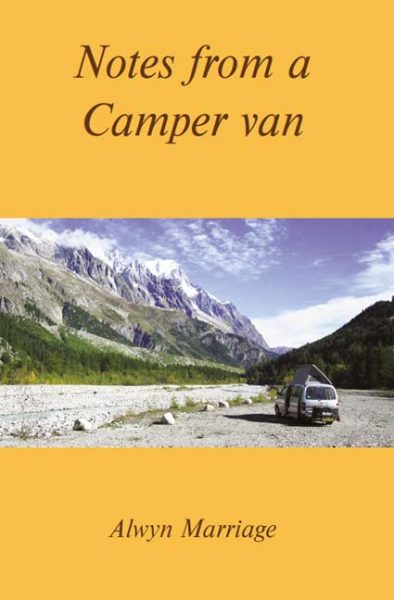Notes from a Camper Van reviewed by Wynn Wheldon. Lunar, January/February 2015
I never imagined camper vans would feature much in my life, but over the last few years they’ve been creeping up on me. Indeed, I’ve probably had as many conversations with friends about camper vans as
I’ve had with them conversations about poetry (and the latter have featured me doing most of the conversing). I’m not generally given to too much ‘I’ in reviews, but I felt I ought to make it clear that Alwyn Marriage’s new collection had found fertile ground even before its pages were opened.
Notes from a Camper Van is as precise a title as one could wish for (and one does often wish for more precise titles). These poems should be read all together, in one journey. It’s a journey without a destination, a wandering hither and thither, and everything is, indeed, noted. Sometimes these notes become observations:
“each spot we spend the night is where
we want to be, and in another sense
is simply on the way to somewhere else”
However, on the whole this little collection consists of descriptions or short narratives, unqualified by any thumping rumination. The weather is ever present, whether it is
“under a blue sky” or
“in the bone-numbing cold / of pre-dawn darkness”.
The van is a home, more than a simple vessel – it might even be considered a character: a previous van is described as “elderly, sedate”. Places are rarely identified very precisely and, although we learn that the Sherpa Van has been to the Hebrides, up the M4, four thousand feet up Mont Blanc, heading West to Wales, these are only places by virtue of their being where the camper van is: it is the primary reality.
Either the poet is travelling or has arrived, though the arrival is at no permanent place; the reader knows that the point is not to stay, but to go, and to be constantly arriving, constantly to be surprised.
Each night differs from the last: there are mysterious animals in the Alps –
“A sudden shriek: was it a bird or a mammal?” –
and on the moors they are disturbed by
“an army / of dog-walkers”.
So there are poems about driving:
“The road ahead is striped,
red on the left in front and white
approaching on the right”
And poems about parking:
“No, I’m not prepared to camp tonight
underneath a pylon”
and notes about the temporary environs:
“We sat and watched wild otters play
on clean white sand”
and poems about sleeping and waking and eating and strolling.
Mostly they are poems that have to do with seeing. There is a sense of going into the world, rather than allowing the days to roll by. It is a kind of anti-quotidian poetry, in which the acts are the same, but the scenes always different.
Moreover, it is extremely simple. However, as anyone who knows their craft will testify, simplicity is very hard, the very opposite of the simplistic. To write poems like this requires the confidence that comes with mastery. It also needs the desire to do it (something often overlooked by those who point and declare “I could do that”).
The language is uncomplicated, and the verse is free, though often gathered into regular stanzas, but the poems have a unifying voice, one which has a quiet rhythm. There is nothing strident or forced: these poems are indeed ‘notes’, from which one day other more substantial work might perhaps bloom. Or not. It doesn’t much matter.
Taken together they add up to a substantial work. And what is more, they’re a pleasure, both vicarious and real.
Now, I think my cousin has an old VW bus he wants to sell…
